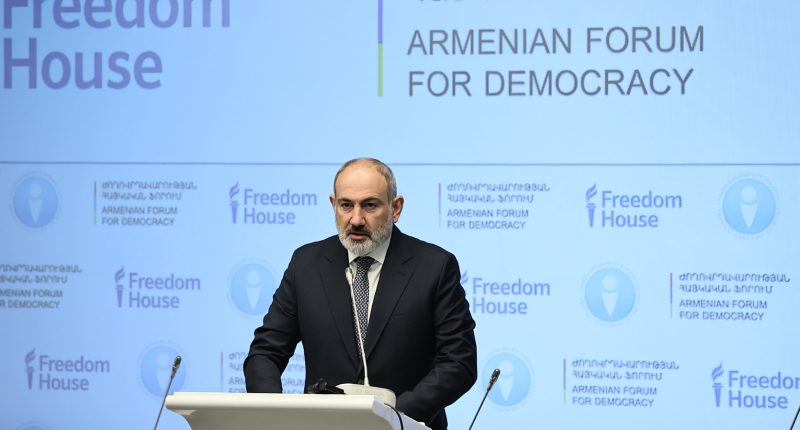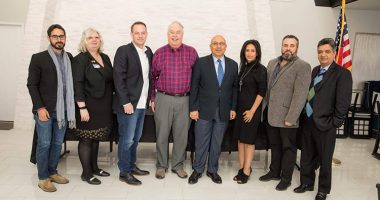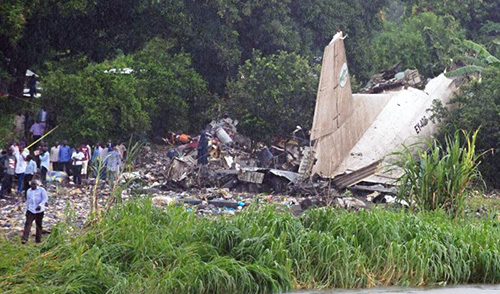YEREVAN — Prime Minister Nikol Pashinyan participated in the third Armenian Forum for Democracy.
The President of the Constitutional Court Arman Dilanyan, Vice President of the National Assembly Hakob Arshakyan, MPs, Cabinet members, Head of the EU Delegation to Armenia, Ambassador Vassilis Maragos, US Ambassador Extraordinary and Plenipotentiary to Armenia Kristina Kvien, Director for Europe and Eurasia programs at Freedom House Marc Behrendt, representatives of civil society, experts were also present at the event.
In his speech, Prime Minister Pashinyan welcomed the attendees and highlighted the importance of holding such forums. “Why is it important to hold such forums and this forum? Because as rightly mentioned, this is a good opportunity to discuss the progress of democracy and democratic reforms in Armenia, to discuss the challenges that exist for democratic reforms and the development of democracy in Armenia. I think that as a result we should emphasize, summarize together what further development tactics we should adopt for democratic reforms and what road map we should have in order to coordinate our efforts in terms of democracy development. This in turn means that this forum should record the collective will of all of us to strengthen and develop democracy in the Republic of Armenia. But for this we also need to record what happened to the agenda of democracy that we had 7 years ago. I must record that the changes that have taken place in Armenia in terms of democracy are not few. For example, the phrases “falsification of elections” or “falsification of election results”, I think, have already been attributed to the historical genre in the Republic of Armenia, and this is very important.”
In that context, the Prime Minister referred to other challenges, in the direction of which tangible positive results have been recorded, in particular, in terms of freedom of assembly of political forces or civil society or ensuring access to certain places for holding assemblies. “There were places, even outdoors, where it was not so easy, if not impossible, to hold a rally or gathering, not to mention renting halls in hotels or other places to hold political events. Or, for example, repression of freedom of the press, I think this is also a topic that, in fact, is a thing of the past in Armenia.”
Nikol Pashinyan also referred to the challenges of strengthening democracy, for which there is still work to be done. “Of course, it is not the case that we have achieved the ideal level of democracy in Armenia or that we are satisfied with the quality of democracy we have. In particular, in my opinion, elections at local government levels are not sufficiently politicized, civil and community oriented. In other words, the perception of the elections that we have at the national level is not as evident at the local government level. Basically, the Republic of Armenia has not established standards for the use of force by law enforcement agencies, which is obviously another problem. What can be done to expand our understanding of the scope of human rights protection? And this applies to everyone’s right, because the narrower the scope of that understanding, I mean, of human rights protection, the more incomplete that system is, even for those who are within that scope. That is, the scope seems to be inclusive, but the narrower the scope, the lower the quality of human rights protection, including for people whose rights do not appear to be at issue. What should be done so that in the absence of systemic corruption, corruption itself does not form alternative systems? What can be done so that the judicial system or the independence of the judicial system is not only a slogan, not only a program, but also a widely perceived reality by the public, so that the public perceives it not as a title, but as a reality that he deals with every day? These are issues that are on the agenda not only of the government, but also of non-governmental organizations and, by and large, the public,” said the Prime Minister.
Nikol Pashinyan emphasized that the statement he made back in 2018 remains unshakable: “democracy for us is not a result of circumstances, that is, it is not a reality caused by circumstances, but it is a strategy. And the government and the ruling majority will continue on this strategic path.”
“One thing is clear: democracy is seriously taking root in Armenia, and the international community perceives the Republic of Armenia more and more as a part of international or global democracy. And this is perhaps the most important record that we can make today and this is perhaps the most visible success that democracy has recorded in the Republic of Armenia,” said the Prime Minister.
Summarizing the speech, Nikol Pashinyan wished success to the third Armenian Forum for Democracy and thanked the civil society representatives and international partners for supporting the implementation of the democratic reform agenda of the Armenian government.
Nikol Pashinyan also participated in the panel discussion within the framework of the forum, during which he answered the questions of the attendees.










